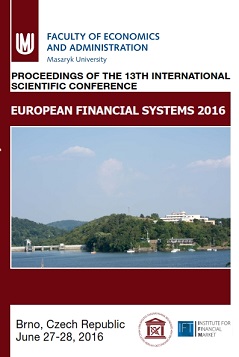Testing the Weak Form of Efficiency on Chinese Stock Market
Testing the Weak Form of Efficiency on Chinese Stock Market
Author(s): Petr Seďa, Juan Antonio Jimber del Río
Subject(s): National Economy, Methodology and research technology, Economic development, Financial Markets
Published by: Masarykova univerzita nakladatelství
Keywords: China; information; efficiency; statistical tests; stock market;
Summary/Abstract: Efficient market hypothesis is one of possible analytical approaches to analyse a behavior of equities on financial markets. The basic idea of the efficient market hypothesis is based on determination of asset prices by relevant information. Thus, it is assumed that efficient market fully and accurately reflects all relevant information. The efficient market hypothesis has been a subject of many investigations that applied different approaches and methods. In this paper, we focused on testing the efficient market hypothesis in its weak form using data from Chinese stock market. Since China belongs to the world's largest economies the special aim of this paper is also to analyze empirically a potential influence of the global financial crisis of 2007-2009 years on the weak form of efficiency of the Chinese stock market. For the purpose of this paper there will be compared efficiency of Shanghai and Hong Kong stock markets in the form of random walk model using both linear and nonlinear statistical tests. These statistical tests delivered different results for both Hang Seng and Shanghai Composite indexes in all sub-periods. Hong Kong stock market became inefficient during the global financial crisis. Contrary to that, efficiency of Shanghai stock market in the crisis period cannot be explained by rational economic arguments.
Book: European Financial systems 2016. Proceedings of the 13th International Scientific Conference
- Page Range: 669-677
- Page Count: 9
- Publication Year: 2016
- Language: English
- Content File-PDF

